第17章
The largest of the bulls was some yards in advance, closely followed by his companion, and the herd in a compact mass came thundering down at their heels.Only fifty yards separated us; we literally felt among them, and already experienced a sense of being over-run.I did not look at the herd, but I kept my eye upon the big bull leader.On they flew, and were within thirty paces of us, when I took a steady shot with the four-ounce, and the leading bull plunged head-foremost in the turf, turning a complete summersault.Snatching the two-ounce from the petrified gun-bearer, I hadjust time for a shot as the second bull was within fifteen paces, and at the flash of the rifle his horns ploughed up the turf, and he lay almost at our feet.That lucky shot turned the whole herd.When certain destruction threatened us, they suddenly wheeled to their left when within twenty paces of the guns, and left us astonished victors of the field.We poured an ineffectual volley into the retreating herd from the light guns as they galloped off in full retreat, and reloaded as quickly as possible, as the two bulls, although floored, were still alive.They were, however, completely powerless, and a double-barrelled gun gave each the "coup-de-grace" by a ball in the forehead.Both rifle shots had struck at the point of junction of the throat and chest, and the four-ounce ball had passed out of the hind-quarter.Our friend of yesterday, although hit in precisely the same spot, had laughed at the light guns.
Although I have since killed about two hundred wild buffaloes I have never witnessed another charge by a herd.This was an extraordinary occurrence, and fortunately stands alone in buffalo-shooting.Were it not for the two heavy rifles our career might have terminated in an unpleasant manner.As I before mentioned, this part of the country was seldom or never disturbed at the time of which I write, and the buffaloes were immensely numerous and particularly savage, nearly always turning to bay and showing good sport when attacked.
Having cut out the tongues from the two bulls, we turned homeward to breakfast.Skirting along the edge of the lake, which abounded with small creeks, occasioning us many circuits, we came suddenly upon a single bull, who, springing from his lair of mud and high grass, plunged into a creek, and, swimming across, exposed himself to a dead shot as he landed on the opposite bank about a hundred paces from us.The four-ounce struck him in the hind-quarters and broke the hip joint, and, continuing its course along his body, it pierced his lungs and lodged in the skin of the throat.The bull immediately fell, but regaining his feet he took to the water, and swam to a small island of high grass about thirty yards from the shore.Upon gaining this he turned and faced us, but in a few seconds he fell unable to rise, and received a merciful shot in the head, which despatched him.
We were just leaving the border of the lake on our way to the village, when two cow buffaloes sprang up from one of the numerous inlets and retreated at full gallop towards the jungle, offering a splendid side shot at about a hundred paces.The leading cow plunged head-foremost into the grass as the four-ounce struck her through both shoulders.She was a fine young cow, and we cut some steaks from her in case we should find a scarcity of provisions at Minneria and, quitting the shores of the lake, we started for breakfast.
It was only 8 A.M.when we arrived.I had bagged five buffaloes, four of which were fine bulls.Our revenge was complete, and I had proved that the four-ounce was perfectly irresistible if held straight with the heavy charge of twelve drachms of powder.Since that time I have frequently used sixteen drachms (one ounce) of powder to the charge, but the recoil is then very severe, although the effect upon an animal with a four-ounce steel-tipped conical ball is tremendous.
On our return to the village of Minneria we found a famous breakfast, for which a bath in the neighbouring brook increased an appetite already sharpened by the morning exercise.The buffalo steaks were coarse and bad, as tough as leather, and certainly should never be eaten if better food can be obtained.The tongues are very rich, but require salting.
In those days Minneria was not spoiled by visitors, and supplies were accordingly at a cheap rate--large fowls at one penny each, milk at any price that you chose to give for it.This is now much changed, and the only thing that is still ridiculously cheap is fish.
Give a man sixpence to catch you as many as he can in the morning, and he forthwith starts on his piscatorial errand with a large basket, cone shaped, of two feet diameter at the bottom and about eight inches at the top.This basket is open at both ends, and is about two feet in length.
The fish that is most sought after is the 'lola.' He is a ravenous fellow, in appearance between a trout and a carp, having the habits of the former, but the clumsy shoulders of the latter.He averages about three pounds, although he is often caught of nine or ten pounds weight.
Delighting in the shallows, he lies among the weeds at the bottom, to which he always retreats when disturbed.Aware of his habits, the fisherman walks knee-deep in the water, and at every step he plunges the broad end of the basket quickly to the bottom.He immediately feels the fish strike against the sides, and putting his hand down through the aperture in the top of the basket he captures him, and deposits him in a basket slung on his back.
These 'lola' are delicious eating, being very like an eel in flavour, and I have known one man catch forty in a morning with no other apparatus than this basket.